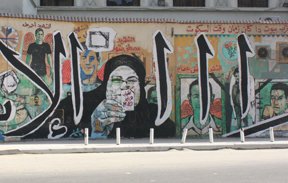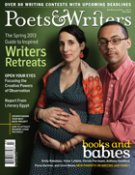Winding my way to the eleven-hundred-year-old al-Azhar Mosque, built during the Fatimid Caliphate, I scoot between crawling traffic and enter the Khan el-Khalil, pass hawkers eager to entice me into shops selling mother-of-pearl furniture and brass serving plates, and eventually leave the tourist section for alleys choked with pedestrians shopping for spices, cloth, produce, appliances, flatware, furniture, and a thousand other items.

This is the neighborhood of Naguib Mahfouz’s Palace Walk (Doubleday, 1990), the first novel in his Cairo trilogy; it is the story of the merchant al-Sayyid Ahmad Abd al-Jawad, a man of contrasts and contradictions—a stern and severe figure in his home, a gregarious and profane raconteur in his shop, a singer and carouser in the apartment of the plump singer who is his mistress.
Backtracking west toward Tahrir Square and the Nile, the streets grow uncharacteristically quiet. It’s the third week of Ramadan, the Islamic holy month when Muslims abstain from food, drink, and sex during daylight hours; the populace is enjoying their monthlong holiday. At Tahrir, the protesters are taking a break, but the violence of the revolution is still on display.
The headquarters of the former ruling party, a fifteen-story monolith situated between the Egyptian Museum (home to mummies and Pharaonic treasures) and the Nile, is a ransacked, burned-out hulk; the roads leading into the adjacent Garden City neighborhood are barricaded by nine-foot walls of concrete blocks put up by the authorities to keep out the protesters. One barrier beside the padlocked entrance to the old American University of Cairo campus has had its cinderblocks pushed apart, and I climb through and continue down the street, past a bustling government ministry fronted by clusters of security officers by the door and a uniformed military guard holding the handles of a fifty-caliber machine gun atop an armored vehicle in the street.
Elaborate graffiti—of Mubarak as a monster and the newly elected President Mohamed Morsi looking calm and charismatic, of hijab-covered grandmothers cheering on gun-waving protesters, of a spray-painted computer power button and beneath it the Arabic words “the people,” and countless other symbols and sayings—covers the walls of the buildings throughout the district.
A few tilting tents with political banners draped over them are still pitched in the center of Tahrir (which is technically a midan or circle, not a square). Here I find a trio of crop-bearded, stern-looking men in their early thirties dressed in soccer sweat suits and flip-flops. They claim underemployment and blame it on the economy, then offer me tea despite the Ramadan prohibitions against eating food or drinking liquids. If Karam Youssef appeared an unlikely street fighter, these men, scarred and unshaven, look better suited to the task.
It’s early August and over a hundred degrees in the shade; there’s no relief from the brittle air, not even after I thank the men for their hospitality and head over to one of the bridges overlooking the muddy, swirling Nile.
A few hours later, evening comes; the minarets of Cairo’s many mosques ring with the Maghrib, the evening call to prayer, and the Cairenes of the downtown awaken and spill out onto the streets to snack, socialize, and shop. Talaat Harb Square, where my hotel is located, becomes a madhouse of honking cars, frustrated drivers, and swarming pedestrians; vendors cover the sidewalks, spreading out rows of cheap sandals, shoes, toys, sunglasses, underwear, slacks, shirts, pots, glasses, and watches; boys help their merchant-fathers by climbing atop chairs and shouting to draw attention to their goods; mothers in hijabs form an inadvertent blockade in front of a shop having a sale; little kids weave in and out of the press dodging cars and people; traffic cops on the street corners look mild and unconcerned (it’s the holiday season, and anyway, their ability to scare the citizenry disappeared thirteen months ago); somebody lights a string of firecrackers; somebody else sends up a bottle rocket.
I weave through the crowd to meet up with Muhamed “Nebo” Abdelnaby, a short story writer, novelist, and translator, in the Greek Club, a semiprivate salon located on the second floor of another dusty and beautiful nineteenth-century building. It’s the only place that serves alcohol to locals during Ramadan, Nebo says. The Greek Club has twelve-foot ceilings and arched lintels between paneled columns; a pair of pocket doors opens onto a room with glassed-in bookshelves and more tables. Tall windows are shuttered and curtained. We’re at a wooden four-top against the paneled back wall, watching as artists, writers, musicians, filmmakers, journalists, and lawyers (a creative profession in Mubarak’s Egypt) fill the tables of the club. It’s nearing midnight.
“We call it ‘the Society,’” Nebo says, and he nods at the people around us.
Of modest stature, with delicate features and slender, black-framed, tinted glasses, Nebo is thirty-five but looks younger. He has an easy, mischievous smile and occasionally marks his points with hand gestures. He calls polite greetings to one table after another: to a crowd of attractive young people in casual clothes—some of the men with ponytails, some of the women in sleeveless tops—and to a table of middle-aged journalists with unshaven faces in suits without ties. He appears to be on a first-name basis with half the room, which, at this point in the evening, numbers about fifty.
The new president, Morsi, received his PhD from the University of Southern California, and I assume this crowd was also educated in the West until Nebo begins to describe his childhood. His illiterate father moved from the countryside, abandoning a peasant’s life for a factory job in the workers’ suburb of Shubra al-Kheima, in the early 1970s. When Nebo was five, his parents enrolled him in a religious school. They weren’t particularly religious, he says, but the public kindergartens only accepted kids aged six and older. After that, much of Nebo’s childhood was devoted to memorizing the Koran and other religious texts. “It helped me be strong in the Arabic language,” he says and sips his beer.








